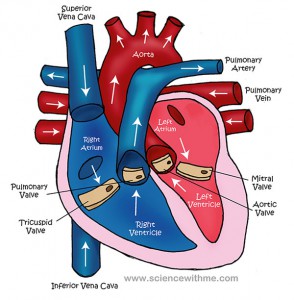I linger on the flathouse roof, the moonlight is divine.
But my heart is all aflutter like the washing on the line.~Nathalia Crane
What happens when your heart actually is “aflutter”? FYI: You need to see a doctor.
1) What is Atrial Fibrillation?
A heart that is aflutter may be in Atrial Fibrillation.
The word atrial refers to the atria, the two upper chambers of your heart. Fibrillation is a change in the normal heartbeat.
In a previous post, an infographic shows the relationship between heartbeat and blood pressure. In that post, the heartbeat is also  described.
described.
A heartbeat is a two part process that takes about a second. During the first part, blood flows into the right and left atria (the top half of the heart). The sinoatrial (SA) node sends an electrical impulse to the atria that causes them to contract, pushing blood into the ventricles through the tricuspid (right side of heart) and mitral (left side of heart) valves. This phase is called the diastole.
The second part of the pumping process is called the systole. Another electrical pulse from the SA node closes the mitral and tricuspid valves and causes the ventricles to contract. From the right ventricle, blood flows into the pulmonary artery to the lungs to replenish oxygen and get rid of CO2. Oxygenated blood flows into the aortic artery from the left ventricle and to the rest of the body.
So, the two atria receive blood, while the two ventricles send blood out. Your atria and ventricles work together. They contract and relax because of electrical impulses in your heart. When you have atrial fibrillation, your upper chambers quiver. They are out of sync and do not work with the ventricles effectively.
Below is a portion of an animation created by the American Heart Association (AHA). The original is at AHA Atrial Fibrillation.
2) Symptoms of Atrial Fibrillation
There are warning signs of AFib that are important to know. The first is a strange feeling heartbeat; it may be racing, feel as though it is fluttering or pounding or just feel odd. Other symptoms include feeling extremely tired, feeling faint or having shortness of breath. Anxiety and even chest pain can be indicators of a problem for some people.
One problem with Atrial Fibrillation is that you may not experience any indications that you have the condition. This is why having a regular yearly appointment is critical to your health. If you have any of the risk factors for AFib (see next section), you should be checked by your physician.
3) Who Gets AFib?
 It may seem counter intuitive, but people who are elite athletes are at risk for Atrial Fibrillation. Middle aged male endurance athletes have been shown to have as much as a 5-fold increase of AFib. This may be due to a reconfiguration of the heart muscle (enlarged atrium and/or fibrosis) that occurs with extreme conditioning. Elite athletes are people who vigorously exercise over long periods of time; as one researcher put it “the greatest levels of physical activity possibly increasing AF incidence.”
It may seem counter intuitive, but people who are elite athletes are at risk for Atrial Fibrillation. Middle aged male endurance athletes have been shown to have as much as a 5-fold increase of AFib. This may be due to a reconfiguration of the heart muscle (enlarged atrium and/or fibrosis) that occurs with extreme conditioning. Elite athletes are people who vigorously exercise over long periods of time; as one researcher put it “the greatest levels of physical activity possibly increasing AF incidence.”
Other risk factors include high blood pressure, diabetes, sleep apnea, hyperthyroidism, kidney disease and previous heart attack or heart failure. Smoking, drinking alcohol and sometimes too much caffeine can also cause Atrial Fibrillation. Stress, obesity and poor sleep are also triggers to AFib. As you get older, your risk of AFib increases.
4) Risks From AFib
One of the major concerns for those with Atrial Fibrillation is stroke. This is because, when your atria aren’t pumping properly, blood tends to stay there. Clotting can occur. Strokes are caused by blood clots stopping the blood flow to the brain. Your risk of stroke increases 5 times if you are someone with Atrial Fibrillation and the strokes tend to be more severe. Those with AFib are also at increased risk of congestive heart failure.
According to the CDC, between 2.7 and 6.1 million people in the US have Atrial Fibrillation. It is the most common form of arrhythmia (heart beating at an abnormal rhythm).
5) What Can I Do About AFib
Knowing the risks for Atrial Fibrillation, the symptoms and the fact that some people have no symptoms are important first steps to addressing this condition.
If you have AFib, your doctor can prescribe medications that control the heart’s rhythm. There are also medications available to thin the blood, stopping clots from forming and so reducing the risk of stroke. Surgery is also an option.
September is Atrial Fibrillation Awareness Month
As many as 750,000 hospitalizations and 130,000 deaths a year are caused by AFib. Spread the word. Help save lives.






Several years ago I had fluttering in my chest. I was told that my heart was skipping a beat. After a couple of months it stopped. It wasn’t an everyday thing. Now when I rest my head on my arm, I hear a skip but no fluttering. Should I be concerned? I am 66 and have diabetes. I was told nothing to worry about.
I have AF and would like any new updates regarding this problem. My heart is still in AF. Does the operation process help with AF?
I have PAF and was told it is usually progressive. I can’t take blood thinners as I have had 3 big GI bleeds with no cause found. I was also told that there is a certain age beyond which the AtriaCure ablation procedure cannot be done. I am 74. Should I talk to my Doc about getting that done or is it too late?
We cannot make medical recommendations here. However, it is always important to communicate all of your concerns to your physician and, if you are not satisfied, get a second opinion. Click on the link to learn how to get a second opinion.